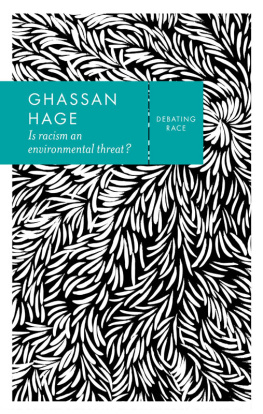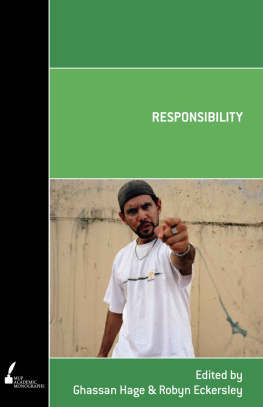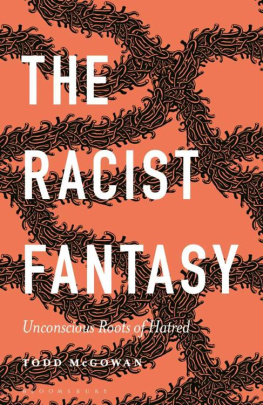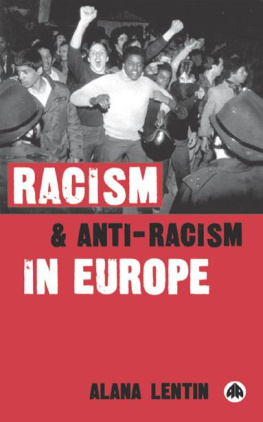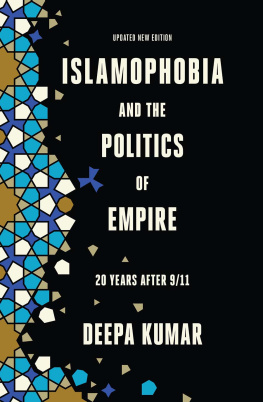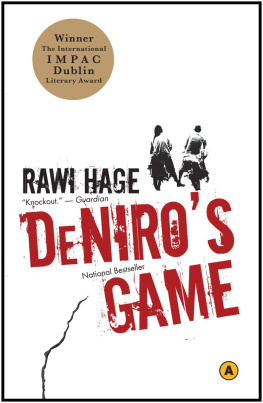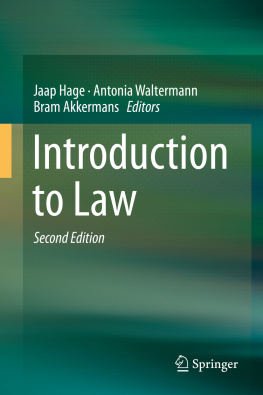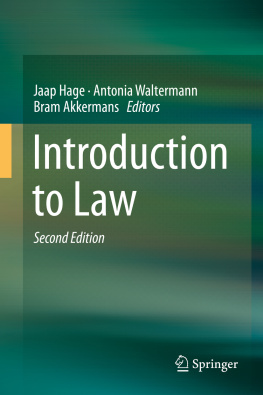
Series page
Debating Race series
David Theo Goldberg, Are we all postracial yet?
Ghassan Hage, Is racism an environmental threat?
Jonathan Marks, Is science racist?
Copyright page
Copyright Ghassan Hage 2017
The right of Ghassan Hage to be identified as Author of this Work has been asserted in accordance with the UK Copyright, Designs and Patents Act 1988.
First published in 2017 by Polity Press
Polity Press
65 Bridge Street
Cambridge CB2 1UR, UK
Polity Press
350 Main Street
Malden, MA 02148, USA
All rights reserved. Except for the quotation of short passages for the purpose of criticism and review, no part of this publication may be reproduced, stored in a retrieval system or transmitted, in any form or by any means, electronic, mechanical, photocopying, recording or otherwise, without the prior permission of the publisher.
ISBN-13: 978-0-7456-9226-5
ISBN-13: 978-0-7456-9227-2 (pb)
A catalogue record for this book is available from the British Library.
Library of Congress Cataloging-in-Publication Data
Names: Hage, Ghassan, author.
Title: Is racism an environmental threat? / Ghassan Hage.
Description: Malden, MA : Polity, 2017. | Series: Debating race | Includes bibliographical references and index.
Identifiers: LCCN 2016041398 (print) | LCCN 2017006034 (ebook) | ISBN 9780745692265 (hardback) | ISBN 9780745692272 (paperback) | ISBN 9780745692296 (Mobi) | ISBN 9780745692302 (Epub)
Subjects: LCSH: Racism. | Environmental degradation. | BISAC: SOCIAL SCIENCE / Discrimination & Race Relations.
Classification: LCC HT1521 .H237 2017 (print) | LCC HT1521 (ebook) | DDC 305.8dc23
LC record available at https://lccn.loc.gov/2016041398
Typeset in 11 on 15 pt Adobe Garamond
by Toppan Best-set Premedia Limited
Printed and bound in the UK by Clays Ltd, St Ives PLC
The publisher has used its best endeavours to ensure that the URLs for external websites referred to in this book are correct and active at the time of going to press. However, the publisher has no responsibility for the websites and can make no guarantee that a site will remain live or that the content is or will remain appropriate.
Every effort has been made to trace all copyright holders, but if any have been inadvertently overlooked the publisher will be pleased to include any necessary credits in any subsequent reprint or edition.
For further information on Polity, visit our website:
politybooks.com
Dedication
To Dominique and Aliya
Preface
This book, as indicated by the title of the series it belongs to, is about debating race. It does so, however, in a slightly unusual way. It examines how racism is connected to the ecological crisis. This, I hope, will help us understand both better. Readers of my earlier works on racism will note that some of the book's key concepts, especially that of domestication, have been emerging in my work for many years now (see Hage 1996, 2000, 2003). I have aimed to develop them more fully here. Nonetheless, it should be clear that this book is neither a scholarly work that systematically interacts with existing literature in the fields of racism and environmental studies, nor is it an ethnographic work that can afford to dwell on a wealth of empirical data. There will be enough to direct readers who want either or both of the above. But the text itself is in the essay tradition. I weave together some theoretical and empirical material into what I trust are some coherent propositions about the way racial and ecological questions are related.
The principal proposition is that practices of racial and ecological domination have the same roots. They emanate from what is today the dominant mode of inhabiting and making ourselves viable in the world, what I call generalized domestication. This concept is central to the book. It is a concept that will, I hope, perform a critical function: it invites readers to start looking at common things slightly differently. It directs them toward an atypical way of experiencing the racial and the ecological domains. And perhaps, on an optimistic note, it might also point a way out of the racial and ecological impasse in which we find ourselves today.
There is a sense in the early twenty-first century that any twentieth-century problem that can be solved has been solved. We are left with spaces of intractable conflicts and impasses. Ireland is behind us and we're left with Israel/Palestine, so to speak. Not many people, then, are game to write about such enduring social problems with a claim to provide solutions. I certainly am not. The idea that one can have a solution to racism, or to the ecological crisis, borders on the ridiculous. But even if we agree with Bruno Latour that we have never been modern, we might also have to accept that we are incurably modern enough in that we cannot help but live in hope. I therefore write expecting that I can leave the reader with a perspective that allows for a richer way of confronting and negotiating those impasses.
There are many people I need to thank in the making of this book, not least the many cohorts of students who have listened to me and engaged with me on the topic of domestication since I began deploying it in the early nineties. I am also grateful to the groups of graduates and academics who, over the years, have either endured me because they had to, or generously invited me and offered me a space to develop my argument in Australia, Lebanon, Europe, and the United States. And I cannot but specifically mention all the organizers and participants in the mother of all racism workshops, the 2014 bus tour of South Africa.
Domestication was the central problematic of a large Australian Research Council grant. This allowed for many engaging discussions with John Cash, Gerhard Hoffstaedter, Michael Jackson, Geoffrey Mead, Gillian Tan, and Henrik Vigh. Special thanks to Geoffrey Mead who has helped with the editing and the referencing. Many other friends/colleagues who have been important either as people who listened to me, or people I have listened to, or both, need also to be thanked: Fadi Bardawil, Lauren Berlant, Niko Besnier, Peter Dwyer, Didier Fassin, Kelly Gillespie, David Theo Goldberg, Karim Makdisi, Saree Makdisi, Achille Mbembe, Monica Minnegal, Meaghan Morris, Stephen Muecke, Beth Povinelli, Francoise Verges, Eduardo Viveiros de Castro, and Bettina Stoetzer.
Finally, I want to ritualistically (since rituals are important), and non-ritualistically (to emphasize that I am not merely mouthing thanks in a routinized way), thank my family of women starting with my mother May and my sisters Nada and Amale. As always, Caroline Alcorso subjected my imaginative leaps to her healthy empiricism, which does not mean she always managed to curb them. Last but hardly least I want to thank my daughters Dominique and Aliya, who have offered me a gift I have often referred to in my work, and which is crucial to understand this book's conclusion: this is the gift of their mere presence in my life. Since this book is concerned with a future politics, I dedicate it to the two of them.
Introduction
To argue that a social phenomenon is related to the ecological crisis is not difficult today. It is the single most important crisis that has ever faced humanity. When a crisis is deemed ecological or environmental it is no longer a crisis in a specific relationship to x or y. It becomes a crisis of the very milieu in which we can have relationships to x or y. This was dramatically illustrated by a garbage crisis in Lebanon in 2015. It began as a breakdown in the garbage disposal system due to its complex entanglement with the logic of economic and political sectarian competition in the country. As people began to dispose of their rubbish anywhere they could, the garbage started fouling the already polluted environment. Soon the street smells, the ugly appearance of sea and mountain vistas, the contaminated rivers, permeated everything, causing inconveniences, discomfort and disease. Garbage disposal was no longer an unmanageable relation to garbage; it became constitutive of the entire social atmosphere. It affected the way people worked, their mood, where children played, what could be eaten and where one could eat, how and where one could exercise, and moreIt is this all-encompassing quality that defines the environmental crisis we are facing globally today.
Next page
